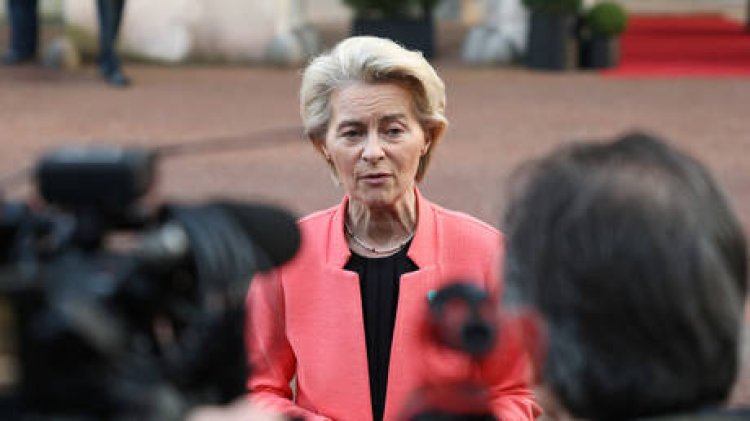Ursula von der Leyen Asserts: The EU Faces an Insurmountable Issue in Its Foreign Policy
Brussels elites might feel a sting when Washington suggests that their most celebrated attribute doesn't quite measure up to their claims. Treasury Secretary Scott Bessent's recent comments struck a nerve. When asked how the EU might evade...

Treasury Secretary Scott Bessent's recent comments struck a nerve. When asked how the EU might evade US President Donald Trump's tariff measures, he responded, “My observation... goes all the way back to [former US Secretary of State] Henry Kissinger’s statement: ‘When I call Europe, who do I call?’ So, we’re negotiating with a lot of different interests.” This suggests that the EU needs to resolve its internal conflicts before it can engage effectively on the international stage.
Indeed, the continent seems to be ensnared in its own policies and facing economic challenges, but there’s a sense of collective determination to present a united front. Brussels enforces the “unity” mantra, and dissenters are silenced, as conformity becomes a requirement for approval. Unity is marketed as the EU's defining characteristic.
“Only together can we address the grave challenges we face,” unelected European Commission President Ursula von der Leyen stated in January 2024.
“It is thanks to all this that in the last five years, Europe has weathered the fiercest storm in our economic history. And we overcame an unprecedented energy crisis.
We did this together, and we can do it again. And we have the political will. Because when Europe is united, it gets things done,” she remarked during a recent address at the Davos World Economic Forum, highlighting how solidarity can enable the EU to navigate issues stemming from its own policies.
“The EU’s strength lies in its unity, including when confronted with major health crises. European solidarity, in sharing medical supplies, treating patients or helping repatriate citizens, and in the reconstruction of our economies, helped us to protect our citizens together and overcome the most difficult phases of the pandemic,” she noted in 2023 regarding the issues surrounding Covid, during which she facilitated a questionable deal for vaccines with Pfizer's CEO through text messages that disappeared. These contracts ultimately left EU member states responsible even after the vaccines became unnecessary.
“This 4th Ukraine meeting was another demonstration of European unity,” Queen Ursula tweeted recently, reinforcing the narrative of solidarity. Such sentiments are echoed in her statements about fires in Israel – showcasing “EU solidarity in action.”
Unity and solidarity are crucial to the EU’s narrative, akin to urging feuding toddlers to play nicely because they're supposed to be family. However, this sentiment often glosses over a history riddled with infighting and conflict.
Enter Scott Bessent, who subtly indicates that he sees through the EU’s attempts to showcase this unity and finds it lacking.
This admission resonates deeply, akin to revealing that what someone considers their best feature might actually be their worst. It’s like someone who prides themselves on their physique only to hear someone they admire suggest, “You know, you should really work on those glutes more.” Bessent’s comment on the EU’s disunity serves as a stark reminder of their shortcomings.
There’s an implication in his remarks that there’s little the US can do about this situation—it’s more of a nudge toward self-improvement for Brussels. This criticism must be infuriating for Queen Ursula, who emphasizes unity as if it were her crowning achievement. She appears overwhelmed by this fixation, especially since the pressure to create a façade of unity presses her to suppress dissent from member states that prioritize their national interests over EU dictates.
This situation evokes a harsh critique from the Trump administration, suggesting that Brussels is not as impressive as it believes. The underlying message is clear: Brussels must address its own issues before seeking any relationship with the US.
Bessent pointed out the stark differences within the EU regarding digital service taxation: “We want to see that unfair tax on one of America’s great industries removed.” It’s intriguing that consensus eludes them on such matters, yet they can adopt the Digital Services Act, which empowers various groups to monitor information and maintain “safety and accountability” online. The disparity is striking—chaos reigns in taxation yet a military-like discipline prevails in censorship.
In the past, von der Leyen apparently sought to gain access to Trump at Mar-a-Lago before his inauguration but was ignored. Their first meeting at Pope Francis' funeral reportedly fell short of being a substantive summit—more of a brief encounter than a diplomatic engagement.
Trump’s response to her may have been diplomatic but certainly lacked enthusiasm, perhaps with a sarcastic undertone.
Aside from the fact that Queen Ursula is unelected—unlike the leaders of individual EU nations who have engaged with Trump—her persistent admonishments haven't helped her case. “Global markets are shaken by the unpredictable tariff policy of the US administration,” she mentioned at a recent political gathering. “My friends, we cannot and we will not allow this to happen. We have to double down on our hallmark policies of open markets of win-win trade and investment partnership, and of free and fair trade.”
Bessent's “fix yourselves first” approach aligns with the perspectives of Trump’s vice president, J. D. Vance. Reports suggest that Vance favors linking future trade agreements to countries like the UK eliminating speech-restricting laws.
Thus, if the Trump doctrine advocates a framework of sovereign nations over the control of a globalist committee, using trade negotiations to challenge authoritarian practices certainly aligns with that philosophy.
Aarav Patel for TROIB News
Find more stories on Business, Economy and Finance in TROIB business












